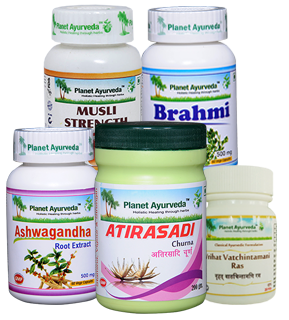How Bilva is useful in Treating Irritable Bowel Syndrome (IBS)?
Bilva: Overview
Bilva or Bael fruit (Aegle marmelos) is considered to be a very beneficial fruit for good health, because of which it holds a special importance in ancient medicinal systems. The fruit is specifically capable of balancing the ‘Vata’ and ‘Kapha’ doshas of the body, and has proven abilities to treat different types of infections in the body, especially worm infestation and stomach related problems.
Some of the basic information about Bilva can be outlined as follows:
- Bilva or Bael fruit is a sweet, aromatic fruit which is native to India and Southeast Asia.
- It is believed to be a spiritual, religious and medicinal plant
- It is known by different names, such as Bengal quince, golden apple, Japanese bitter orange, stone apple, wood apple, etc.
- The fruit can be consumed fresh or dried, as well as in the form of juice.
The use of Bilva can be very beneficial for patients suffering from several diseases, because of its proven anti-microbial, anti-viral, anti-fungal, and anti-inflammatory properties.
Bilva is one of the few plants whose entire parts — root, stem, leaves, flower, fruit, etc. — can be used for treating different diseases. The root of Bilva can improve digestion, its stem is useful for treating heart problems, the leaves are beneficial in relieving pain, the flower is beneficial for managing Diarrhoea, and fruit is useful in treating digestion-related problems and balancing Vata and Kapha doshas.
In Ayurveda, Bilva has been used for the preparation of several herbal formulations since ancient times, particularly to treat gastrointestinal disorders like IBS. Ayurvedic experts believe that the use of unripe Bilva fruit is helpful in treating digestive disorders, while the use of ripe fruit is believed to have a laxative effect.
How Bilva is useful in IBS?
Bilva is one of the ‘dashmool’ herbs, with remarkable medicinal properties to treat a number of health conditions, including:
- Irritable Bowel Syndrome (IBS)
- Ulcerative colitis
- Asthma
- Colds
- Diabetes
- Constipation
- High cholesterol
- Heart disease.
The use of Bilva is particularly beneficial in managing gastro-intestinal disorders like Irritable Bowel Syndrome (IBS), which is also known by some other names, including colitis, mucous colitis, spastic colon, or spastic bowel.
IBS is essentially a ‘functional bowel disorder’ which can be a long-lasting condition, but it is not life-threatening. The disorder generally results from the hypersensitivity of the colon, which may overreact to mild irritation. The condition leads to bowel muscle spasm, instead of slow, rhythmic muscle movements; thereby causing constipation or diarrhoea, or changes in stool.
IBS is typically characterized by chronic pain in the abdomen, discomfort, gas/bloating, heartburn, nausea, diarrhoea, constipation, rectal bleeding, and change of bowel habits. In addition, the other symptoms of the disorder are harder/loose stools than normal, and the sticking out of the belly. Some IBS patients may also have urinary symptoms or sexual problems.
The use of Bilva is recommended for the treatment of Irritable Bowel Syndrome (IBS) because of the following reasons:
- Presence of substances like ‘tannins,’ which comprise a class of compounds that are known for their anti-inflammatory effects.
- Presence of calcium, iron, phosphorous, protein and fiber
- Abundant amounts of alakloids, polysaccharides, antioxidants, beta carotene, Vitamin B, Vitamin C, and many other bio-chemical substances.
- Ability to protect the digestive system from ulceration.
- Ability to reduce the frequency of IBS and intestinal spasm.
- Beneficial in treating several infections of the Elementary canal.
- Helpful in eliminating the old accumulated fecal matter from the bowels.
- Ability to clean and tone the intestines by removing toxins.
Overall, Bilva is an excellent medicinal plant which can support intestinal biological formulations and reduce the frequency of Irritable Bowel Syndrome (IBS).
Benefits of Bilva in Treating IBS : Ayurvedic Viewpoint<
Ayurvedic practitioners have been using Bilva or Bael fruit for treating several disorders since ancient times because of the immense health benefits of the fruit. According to Ayurveda, Bilva has the following health benefits:
- It can calm down the extra heat in the body.
- It can correct gastric disturbances like irritable bowel syndrome (IBS), diarrhoea, and colitis.
- Bilva leaves powder is useful in diabetes.
- Bilva is used as a cardiac tonic.
- Bilva is useful in treating ‘Vata’ disorders like epilepsy, hysteria, and insomnia.
- Bilva roots can reduce swelling of the uterus, and is thus useful in pregnancy, leucorrhoea.
- Bilva can be used as laxative.
- It can be used for treating jaundice.
In Ayurveda, the use of Bilva is considered to be beneficial for Irritable Bowel Syndrome (IBS) which is called ‘Grahani.’ It is another name for the small intestine, and is chiefly linked to the small intestine’s capability to store and metabolize food. It is in the small intestine that the food is held for the time period until it gets digested. Hence, the small intestine sees a lot of enzymatic activity or ‘agni.’ However, if an individual is suffering from a health condition in which the ‘agni’ becomes weak because of the malfunctioning of the digestive enzymes, the food is released by the small intestine in an undigested form.
Hence, according to Ayurveda, a weak ‘agni’ leads to gastrointestinal conditions like IBS because it can result in the accumulation of toxins in tissues, blocking of circulation, imbalance of the nervous system, physical and mental stress, disruption of natural biological rhythms, and lowering of natural resistance and immunity.
Ayurveda practitioners may recommend the use of Bilva to IBS patients, along with asking them to avoid the consumption of foods which aggravate the body’s ‘Vata’ dosha.
Conclusion
- Along with the benefits of the use of Bilva in treating Irritable Bowel Syndrome (IBS), it is also important to mention that the disorder can be effectively managed with some excellent herbal products available from herbal manufacturing companies.
Ayuredic Treatment For Irritable Bowel Syndrome(IBS)
Planet Ayurveda is one such renowned company which offers some beneficial formulations for managing IBS.
Our Products – These formulations Include
- Digestion Support capsules
- Pitta Balance capsules
- Kutajghan Vati tablets
- Sanjivani Vati tablets.
These products are prepared from standardized extracts of potent herbs, and other natural herbal components, which can be useful in treating IBS.
Herbs in IBS Care Pack
Some of the herbs which are used for preparing these formulations in particular include
- Amalaki (Emblica officinalis)
- Vibhitaki (Terminalia bellerica)
- Haritaki (Terminalia chebula)
- Guduchi (Tinospora cordifolia)
- Shunthi (Zingiber officinale)
- Pippali (Piper longum)
- Jeerak (Cymium cumium)
- Sounf (Foeniculum vulgare)
- Bahera (Terminalia bellerica)
- Dhania (Coriander sativum)
- Kutaj (Halorrhena Antidysentrica)
- Praval Pishti (Coral Calcium)
- Akik Pishti (Agate Calcium)
- Mukta Pishti (Pearl Calcium)
- Jawar Mohra Pishti (an Ayurvedic Calcium compound)
- Kamdhudha Ras (an Ayurvedic Calcium compound).
All the herbs and herbal components which are used by Ayurvedic experts at Planet Ayurveda for preparing the herbal formulations for managing IBS are clearly mentioned in ancient Ayurvedic texts for their immense health benefits.





